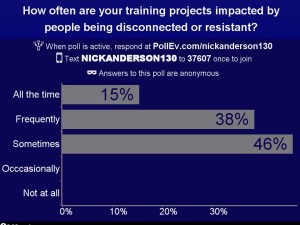 Here’s more evidence of the difficulty many professionals face in bringing about change in their organizations.
Here’s more evidence of the difficulty many professionals face in bringing about change in their organizations.
This latest poll adds to others taken last year during my presentations to Project Management Chapters, Institutional Researchers and HR professionals.
How many more failed changes do we have to go through before leaders and senior management recognize the need to align people for change?
Getting people on the same page takes courage but is an essential ingredient for their professionals to be successful. Too often, the alignment process is not understood or committed to by leaders. Too often it’s left to those with little power and influence, like trainers, project managers and other professionals. It’s no wonder that changes fail due to lack of middle manager’s and other’s buy-in. There are five main reasons for this condition:
- 70% of Leaders’ expectations of those implementing a change are either not known or not understood
- Many leaders think that job descriptions and performance management systems absolve them from this aspect of leadership. So, are often disappointed when people do what they have always done.
- Many leaders confuse 360 degree and other survey methods with getting people on the same page. Yes, they are a useful diagnostic but the reality is that change is personal before its organizational. It’s how leaders engage and use such survey results that matters.
- Many leader’s think that their stated expectations is sufficient to get their people on the same page. They don’t realize the importance of eliciting their people’s expectations of them.
- When leaders gain agreement of their expectations of they often believe they have done their job, when in fact, it has only just started in terms of supporting and developing those expected to deliver on their expectations
Note: This poll was taken during my session with the Association of Talent Development (ATD) in Boise. (2/11/16.
For readers of my recent posts you will see a strong similarity between Project Managers and Trainers. And while these results are based on a small sample they are strikingly similar to the research we did for Focusing Change to Win
